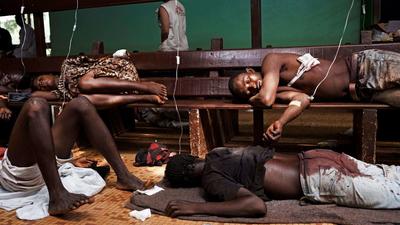Cokie van der Velde, a sanitation specialist with Medecins Sans Frontieres/Doctors Without Borders (MSF), has been helping to combat Ebola in Liberia and Guinea. On Friday she returned to her home in Yorkshire. Here she describes her last day of work in the isolation zone.
“Wake with a sore throat – it’s almost certainly due to inhaling chlorine fumes from our disinfectant solution, but since Kent and Nancy, two people working for another NGO tested positive, paranoia has set in, so I take my temperature for the tenth time that morning. Not sure this is a healthy obsession.
Get up before the other international staff. In a crowded house, getting to the bathroom first is essential for me. Get up too late and you’re fighting for your turn in the loo.
My last day
It’s my last day, so I’m going to the treatment unit to say goodbye to the staff and to lend a hand, as I know they will be short-staffed and the workload is increasing. In the past week, some local staff have resigned or just not turned up for work. I can’t blame them - they’re scared.
Arrive at the treatment centre. Local staff are wandering around. Hear the predictable news of many deaths inside.
Get dressed up in my protective clothing with Sara, an MSF doctor who has a capacity for work and good humour in equal measures.
I really enjoy working with her and am glad to be spending my last day in her company. Three hygienists are joining us to move the bodies. We label the body bags before entering. I like to double-bag bodies but just now there aren’t enough bags to go round.
Suspected cases
Enter the zone for suspected cases, after donning the protective gear and checking that not a millimetre of skin is showing.
We have a strict one-way system - lower risk to higher risk. Start by emptying the buckets of faeces and vomit and saying cheerful good mornings to the patients. I spray chlorine solution as I go - we touch nothing without spraying first, even though we wear three pairs of gloves.
One woman has had diarrhoea and was too weak to walk - she’s been lying in it all night and her thrashings have spread it over the floor. Throw buckets of chlorine and clean the mess.
Sara does a round of the patients, gently caring for each in turn. The three hygienists look either lost or scared - difficult to tell when you can only see people’s eyes.
Confirmed cases
Enter the zone for confirmed cases. This section should house 10 patients, but in fact has 14. Some women who had been in the extension room next door have moved themselves into the corridor, one sleeping on the ground. I wonder why they left their beds to come in here.
In here the patients are much more sick, and I empty buckets and clean floors, helping patients too weak to hold water bottles, and taking bags of rubbish to our pit for burning.
I’m getting hot. It’s very humid and my tiredness has made the length of time I can stay in the protective gear shorter.
Sweat is dripping into my eyes and is making my gloves make squelchy noises as I work. We need to move into the extension area and put the bodies in the bags before we start to feel faint.
I tell Sara I’m moving to the next section and she follows. The three male hygienists are moving slowly - fear seems to be dulling their wits and actions.
Struggling with the bodies
On the way to the extension I cross the outdoor area, where body bags are lying on the ground. The morgue is full. It can only hold six bodies so now we are leaving the dead outside.
The burial teams can’t keep up. I turn the corner and find a dead man in the door-way to the extension. Looks like he crawled there. Wonder what will be inside.
I enter, take in the scene and stop to look back at Sara, who has yet to see what lies before me. She said later she knew it would be bad from my eyes. Now I know why those women had left the room. It could be a scene from a horror film.
In this room, four patients have died and some of them have bled profusely. Blood has mixed with chlorine and faeces on the floor. We struggle to get the bodies into the bags. One hygienist leaves after bagging the first body, the second after bagging the second body.
The remaining hygienist will only hold the chlorine spray, so Sara and I clear the people’s belongings which will have to be burnt. The final two bodies defeat us and we move to the decontamination area.
The team that enters will have to complete the task – the possibility of fainting from heat exhaustion is high and dangerous."



